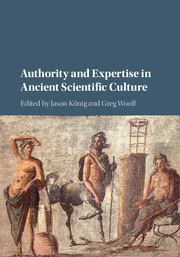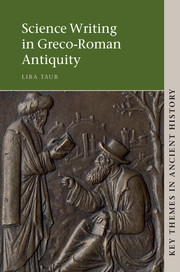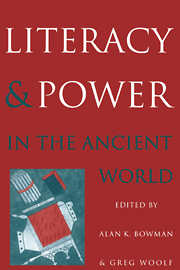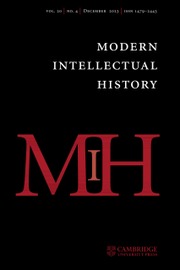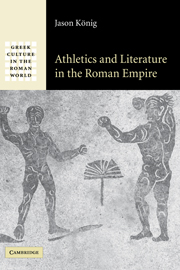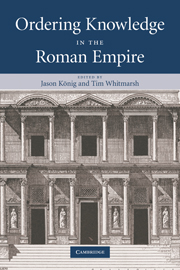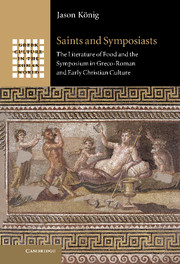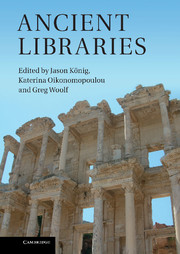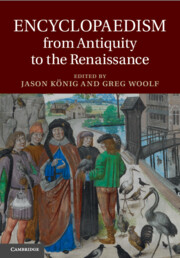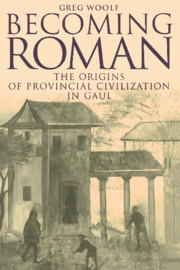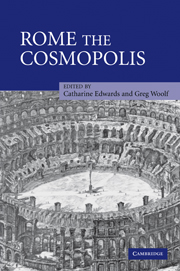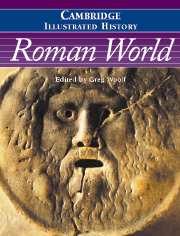Authority and Expertise in Ancient Scientific Culture
- Editors:
- Jason König, University of St Andrews, Scotland
- Greg Woolf, Institute of Classical Studies, London
- Date Published: February 2017
- availability: Available
- format: Hardback
- isbn: 9781107060067
Hardback
Other available formats:
eBook
Looking for an inspection copy?
This title is not currently available for inspection. However, if you are interested in the title for your course we can consider offering an inspection copy. To register your interest please contact [email protected] providing details of the course you are teaching.
-
How did ancient scientific and knowledge-ordering writers make their work authoritative? This book answers that question for a wide range of ancient disciplines, from mathematics, medicine, architecture and agriculture, through to law, historiography and philosophy - focusing mainly, but not exclusively, on the literature of the Roman Empire. It draws attention to habits that these different fields had in common, while also showing how individual texts and authors manipulated standard techniques of self-authorisation in distinctive ways. It stresses the importance of competitive and assertive styles of self-presentation, and also examines some of the pressures that pulled in the opposite direction by looking at authors who chose to acknowledge the limitations of their own knowledge or resisted close identification with narrow versions of expert identity. A final chapter by Sir Geoffrey Lloyd offers a comparative account of scientific authority and expertise in ancient Chinese, Indian and Mesopotamian culture.
Read more- Brings a wide range of ancient disciplines into dialogue with each other, including not just 'scientific' fields, but also areas like law, historiography and generalship which are not usually studied within the history of ancient science
- Pays attention not just to self-assertive styles of authority-construction but also to the importance of various kinds of self-effacement and anti-competitiveness
- Provides original readings of a wide range of individual texts which may be less familiar to scholars and thereby helps to further the recent expansion of interest in ancient knowledge-ordering writing
Reviews & endorsements
'… anyone interested in the study of scientific/technical literature will certainly find something useful in one or another of the seventeen individual papers. … the copyediting is excellent and the volume is easy to use: it has copious notes and bibliography (860 titles); the original texts are often given in addition to the English translation; and there is a helpful index.' Emilie-Jade Poliquin, Bryn Mawr Classical Review
Customer reviews
Not yet reviewed
Be the first to review
Review was not posted due to profanity
×Product details
- Date Published: February 2017
- format: Hardback
- isbn: 9781107060067
- length: 474 pages
- dimensions: 254 x 180 x 30 mm
- weight: 1.02kg
- contains: 1 b/w illus.
- availability: Available
Table of Contents
1. Introduction: self-assertion and its alternatives in ancient scientific and technical writing Jason König
2. Philosophical authority in the Imperial period Michael Trapp
3. Philosophical authority in the Younger Seneca Harry Hine
4. Iurisperiti: 'men skilled in law' Jill Harries
5. Making and defending claims to authority in Vitruvius' De architectura Daniel Harris-McCoy
6. Fragile expertise and the authority of the past: the 'Roman art of war' Marco Formisano
7. Conflicting models of authority and expertise in Frontinus' Strategemata Alice König
8. The authority of writing in Varro's De re rustica Aude Doody
9. The limits of enquiry in Imperial Greek didactic poetry Emily Kneebone
10. Expertise, 'character', and the 'authority effect' in the Early Roman History of Dionysius of Halicarnassus Nicolas Wiater
11. The authority of Galen's witnesses Daryn Lehoux
12. Anatomy and aporia in Galen's On the Construction of Fetuses Ralph M. Rosen
13. Varro the Roman Cynic: the destruction of religious authority in the Antiquitates Rerum Divinarum Leah Kronenberg
14. Signs, seers and senators: divinatory expertise in Cicero and Nigidius Figulus Katharina Volk
15. The public face of expertise: utility, zeal, and collaboration in Ptolemy's Syntaxis Johannes Wietzke
16. The authority of mathematical expertise and the question of ancient writing more geometrico Reviel Netz
17. Authority and expertise: some cross-cultural comparisons G. E. R. Lloyd.
Sorry, this resource is locked
Please register or sign in to request access. If you are having problems accessing these resources please email [email protected]
Register Sign in» Proceed
You are now leaving the Cambridge University Press website. Your eBook purchase and download will be completed by our partner www.ebooks.com. Please see the permission section of the www.ebooks.com catalogue page for details of the print & copy limits on our eBooks.
Continue ×Are you sure you want to delete your account?
This cannot be undone.
Thank you for your feedback which will help us improve our service.
If you requested a response, we will make sure to get back to you shortly.
×
